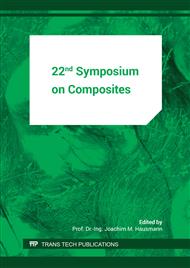p.447
p.452
p.461
p.467
p.473
p.480
p.487
p.493
p.500
Efficient Multiscale Methods for Viscoelasticity and Fatigue of Short Fiber-Reinforced Polymers
Abstract:
To predict the nonlinear mechanical behavior of components made of short fiber-reinforced plastics (SFRP) under long term and cyclic loading, coupled process and component simulations are required. The injection molding process leads to locally varying fiber orientations within the component. This varying microstructure [1] significantly influences the viscoelastic and fatigue behavior. The interaction between the microstructure [2] and the nonlinear macroscopic properties is resolved by a coupled fast Fourier transformation and finite element two-scale method (FFT-FEM), where the fiber orientation tensor is obtained by analyzing μCT images or by the corresponding process simulation. The aim of this work is to reduce the numerical costs of such a multiscale method. In a first step, the highly efficient micro-scale solver FeelMath [3,4] using an FFT-based preconditioner is presented. Afterwards, a numerical scheme based on a precomputed database trained with FeelMath simulations on the microscale and a model order reduction algorithm, is discussed. The combination of these ideas reduces the numerical effort, such that the method is applicable for industrial problems. Comparative studies of the fully coupled and reduced model document the high accuracy of this approach. The overall performance of this methodology is demonstrated by three-dimensional, industrial applications.
Info:
Periodical:
Pages:
473-479
DOI:
Citation:
Online since:
June 2019
Price:
Сopyright:
© 2019 Trans Tech Publications Ltd. All Rights Reserved
Share:
Citation:


